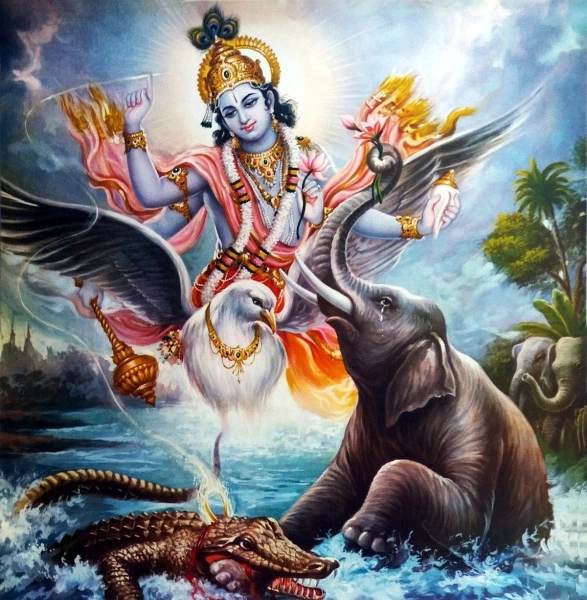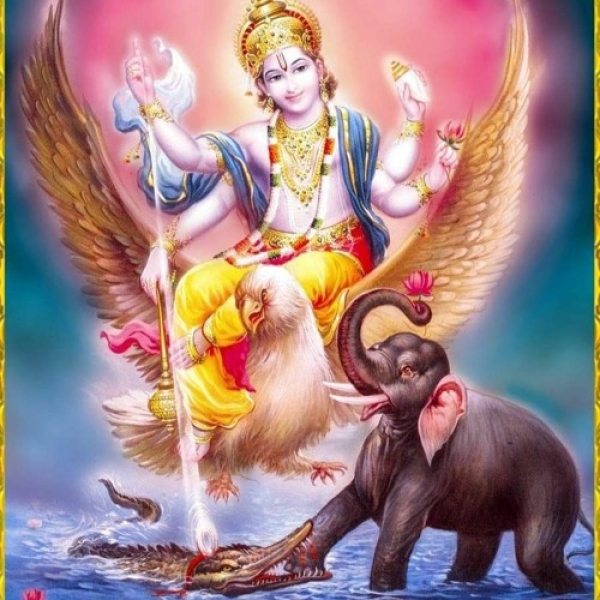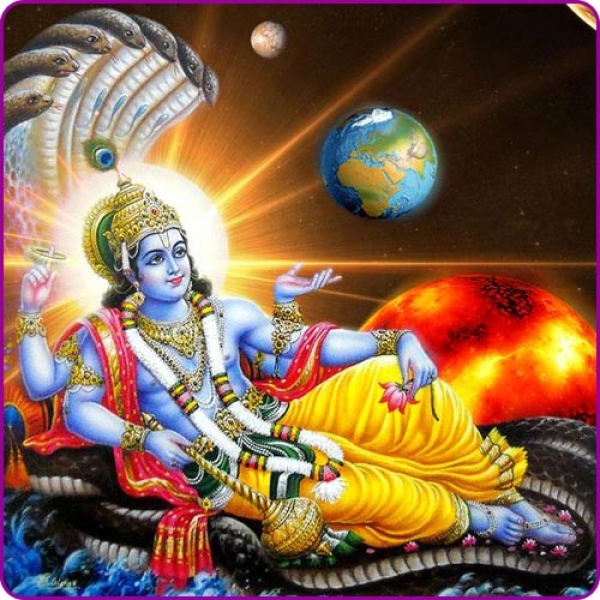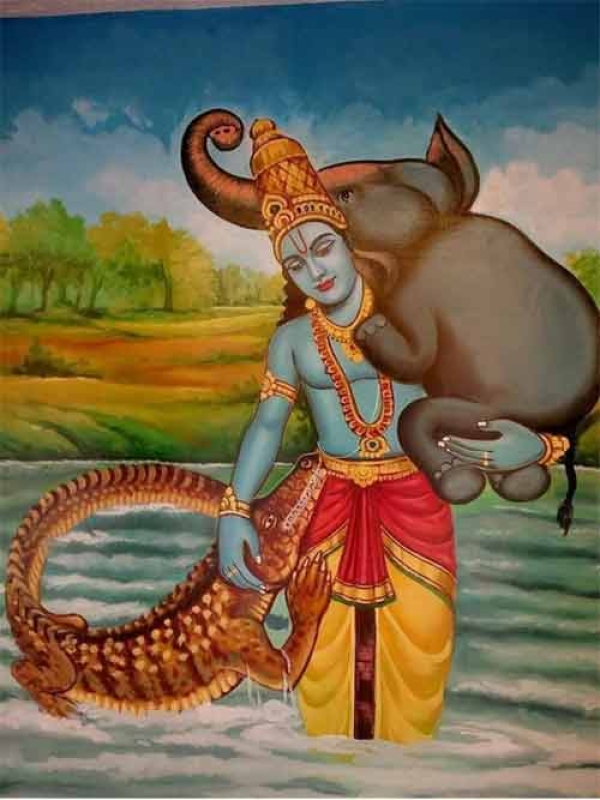
The description of Gajendra Moksha Stotra is in the third chapter of "Srimad Bhagavad Gita", the main text of Hinduism. According to Hinduism, by reciting this original shloka, one becomes free from all the difficulties of life.
According to the Puranas, by reciting this verse, a person not only becomes free from debt, but also becomes free from all troubles. Gajendra Stotra is described in the second, third and fourth chapters of the first book of Hinduism "Srimad Bhagavad Gita". There are total 33 verses in this stotra. In this hymn, the battle with elephant and crocodile is described.
Story of Gajendra Moksha Stotra
In this hymn, the battle with elephant and crocodile is described. The elephant and his family were roaming in the forest, and when he was thirsty, he reached the bank of the lake to drink water. When the elephant saw the lotus flower in the lake, he went out to play in the water. In this, a crocodile grabs the leg of that elephant and does not leave. The whole family tried to get the elephant out of the water and finally could not get it out. The elephant tried to escape, but the crocodile did not leave its legs. When the elephant starts drowning completely, the praise that he had given to Shri Hari Vishnu while calling him is known as Gajendra Moksha Stotra. Hearing this praise, Lord Vishnu came there and protected the yard. Since then this stotra shows the path of liberation from all kinds of troubles.
Gajendra Moksha Stotra
1. Om Namo Bhagawathe Thasmai Yathayetha Chidhathmakam
Purushaa Yaadhi Bheejaaya Paresayaabhi Dheemahi
2. Yasmin Idham Yatha Schedham Tyenedham Ya Idham Swayam,
Yoasmath Parasamacha Parastham Prapadhye Swayambhuvam
3. Ya Swathmaneedham Nija Mayayaa Arpitham,
Kwachid Vibhatham Kwa Cha Thath Thirohitham,
Aviddha Druk Saksha Yubhayam Thadheekshathe Sa,
Aathma Moolo Avathu Maam Parathpara
4. Kaalena Panchathwamitheshu Kruthsnasao,
Lokeshu Paleshu Cha Sarva Hethushu,
Thamas Thadha Aaseed Gahanam Gabheeram,
Yasthasya Parebhi Virajathe Vibhu
5. Na Yasya Devaa Rishaya Padam Vidhu
Janthu Puna Ko Arhathi Ganthu Meerithum,
Yadhaa Natasya Aakruthibhir Vicheshtatho,
Durathya Anukramana Sa Maavathu
6. Dhidrukshavo Yasya Padam Su Mangalam,
Vimuktha Sanghaa Munaya Susaadhava,
Charanthya Loka Vrutha Mavranam Vane,
Bhoothama Bhoothaa Shrudh Sa May Gathi
7. Na Vidhyathe Yasya Cha Janma Karma Vaa,
Na Naama Roope Guna Dosha Yeva Vaa,
Thadhapi Lokaapya Ya Sambhavaya Ya,
Swa Mayaya Thaanyunukala Mruchathi
8. Thasmai Nama Paresaaya Brahmane Anatha Shakthaye,
Aroopyo Roopaya Nama Aascharya Karmane
9. Nama Aathma Pradheepaya Sakshine Paramathmane,
Namo Giraam Vidhooraya Maanasa Schethasam Api
10. Sathvena Prathi Labhyaya Naishkarmyena Vipaschitha,
Nama Kaivalya Nadhaya Nirvana Sukha Samvidhe
11. Nama Santhaya Ghoraya, Moodaaya Guna Dharmine,
Nirviseshaya Samyaya Namo Jnana Ganaya Cha.
12. Kshethragnaya Namasthubhyam Sarvadhyakshaya Sakshine,
Purushaa Yaathma Moolaya Moola Prakruthaye Nama
13. Sarvendrye Guna Drushte Sarva Prathyaya Hethave,
Asathaa Cchaya Yokthaya Sadaa Basaaya They Nama
14. Namo Namasthe Akhila Kaaranaya Nish Kaaranaaya Adbhutha Kaaranaya,
Sarvaa Gamaamnaya Maharnavaya Namo Apavargaya Parayanaya
15. Gunarani Cchanna Chidooshmapaaya,
Thathkshobha Visphoorjitha Manasaya
Naishkarmya Bhavena Vivarjithagama
Swayam Prakasaya Namaskaromi
16. Madruk Prapanna Pasu Pasa Vimokshanaya,
Mukthaaya Bhoori Karunaya Namo Aalayaaya,
Swaamsena Sarva Thanu Brun Manasi Pratheetha,
Prathyag Druse Bhagwathe Bruhathe Namasthe
17. Athma Athmajaaptha Gruha Vitha Janeshu Saakthai,
Dush Praapaanaaya Guna Sanghaa Vivarjithaaya,
Nukthaathmabhi Swahrudaye Pari Bhavithaya,
Jnanathmane Bhagwathe Nama Ishwaraya
18. Yam Dharma Kama Artha Vimukthi Kaama,
Bhajantha Ishtaam Gathi Mapnuvanthi,
Kim Thwaasisho Rathyapi Deha Mavyayam,
Karothu May Adha Brudhayo Vimokshanam
19. Yekanthino Yasya Na Kanchanarrdhaa,
Vanchasnthi Ye Vai Bhagawat Prapanna,
Athyadbhutham Thaccharitham Sumangalam,
Gayantha Aananda Samudhra Magnaa
20. Thamaksharam Brahma Param Paresam,
Avyaktha Madhyathmika Yoga Gamyam,
Athheendriyam Sookshma Mivathi Dhooram,
Anantha Maadhyam Paripoorna Meede
21. Yasya Brahmadayo Deva Loka Scharachara,
Nama Roopa Vibheedheena Phalgvyaa Cha Kalaya Krutha
22. Yadharchisho Agne Savithur Gabhasthayo,
Niryanthi Samyaanthya Sakruth Swarochisha,
Thadhaa Yathoyam Guna Sampravaho,
Budhir Mana Kaani Sareera Sargaa
23. Savaina devaa asura marthaya thiryang,
Na Sthree Na Shando Na Puman Na Janthu,
Naayam Guna Karma Na Sanna Na Chasath,
Nishedha Sesho Jayathad Asesha.
24. Jeejee Vishe Naaha Mihaamuyaa Kim,
Anthar Bahi Schavrutha Ye Bhayonyaa,
Icchami Kalena Na Yasya Viplava,
Thasya Aathma Loka Varanasya Moksham
25. Soham Viswa Srujam Visamam Aviswam Viswa Vedhasam,
Vishwathamanam Ajam Brahma Pranathosmi Param Padam
26. Yoga Randhitha Karmaano,
Hrudhi Yoga Vibhavithe,
Yogino Yam Prapasyanthi,
Yogesam Tham Nathosyam Aham
27. Namo Namasthubhyam Asahya Veda Shakthi Thrayaya Akhiladhi Gunaaya,
Prapanna Paalaya Durantha Shakthaye Kadheendriyaanamana Vapya Vaathmane
28. Nayam Veda Swamaathmaanam Yacchakthyaa Hamdhiyaa Hatham,
Tham Durathyaya Maahatmyam Bhagawantha Mitho Asmyaham
Benefits of Gajendra Moksha Stotra
According to Hindu scriptures, when you get stuck in some terrible trouble, then by reciting Gajendra Moksha stotra, Lord Vishnu will get you out of that trouble like he had pulled Gajendra name from the mouth of a crocodile. By reciting Gajendra Moksha stotra, one gets freedom from debt and Pitra Dosh and gets rid of enemies and destroys bad luck. By chanting it continuously, a person becomes free from all sins.
Shri Krishna has said in the Bhagavata Purana that nothing will be impossible for a person who will read or listen to it, he will surely attain me and will be very dear to me.
Fruit of Gajendra Moksha Stotra
By worshiping it continuously, a person becomes free from all sins. All the troubles get resolved. The nightmares are destroyed. All kinds of obstacles are destroyed. And he never goes to hell after death, such is the word of God himself.
ALSO READ: Lal Kitab Remedies for wealth and prosperity
Dr. Sandeep Ahuja, an Ayurvedic doctor with 14 years’ experience, blends holistic health, astrology, and Ayurveda, sharing wellness practices that restore mind-body balance and spiritual harmony.